2018 American Association of Equine Practitioners Convention Coverage
Read the latest in equine health research, news, and information presented at the 64th Annual AAEP convention in San Francisco, California
Each year The Horse’s team of staff and reporters attend the American Association of Equine Practitioners’ (AAEP) Convention, which is the world’s largest gathering devoted to horse health. This year 5,156 equine veterinarians, researchers, students, and industry professionals attended the event, held Dec. 1-5, in San Francisco, California. Attendees gained access to 127 hours of continuing education across all aspects of equine medicine, including dentistry, complementary medicine, reproduction, and more. The following articles include our in-depth AAEP convention lecture coverage from 2018.
Section Title

PPID and Laminitis in Horses: What’s the Relationship?
It still isn’t clear how PPID leads to insulin issues and subsequent laminitis. But vets and researchers do know that, regardless of how PPID horses develop insulin dysregulation, having both conditions leads to a poorer prognosis than having either alone.

Potomac Horse Fever Vaccination Options for Horses
PHF is a serious disease in horses and expensive to treat, say veterinarians. Find out your options.

Vets Discuss How They Use SAA in Equine Practice
An SAA test can identify illness in horses, and it can also ensure they’re healthy enough for other procedures, such as surgery. Here’s a look into how some vets use SAA in their practices.

How Veterinarians Use Chiropractic to Assess Equine Back Pain
Veterinarians are using chiropractic techniques more frequently to evaluate and treat back disorders in horses. Here, a CSU professor and researcher outlines basic principles.

Equine Influenza: Vaccinating for Optimal Protection
Equine influenza is one of the most contagious and costly diseases. As such, preventing its spread in the first place is the easiest course of action.
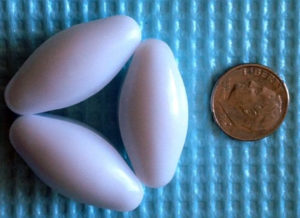
New IUD for Suppressing Estrus in Mares
Researchers successfully tested a drug- and hormone-free approach for suppressing estrus in mares they say is safe, easy, and doesn’t affect future fertility.

Prepurchase Exams for Upper-Level Sport Horses
There’s no getting around it: Horses—especially those expected to perform at a high level—are risky purchases. But a thorough prepurchase exam can help give you confidence that you’re making the right investment for your scenario. Here’s what practitioners look for during prepurchase exams for upper-level sport horses.

Retained Fetal Membranes in Mares: Pros and Cons of Manual Removal
A recent study showed that controlled manual removal of retained fetal membranes in mares had a relatively low risk for both normal foaling and high-risk mares. But this technique isn’t without complications.

Managing Postpartum Metritis in Mares
The main goals when treating metritis (inflammation of the uterine wall) in mares are to control bacterial growth, evacuate uterine contents, and prevent complications. Here’s how vets accomplish these goals.
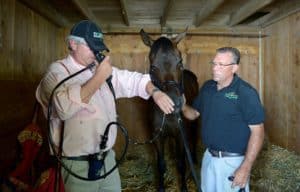
Evaluating Airway Function in Horses: How Well Do Vets Agree?
Arytenoid function can impact both sales price and airway function in horses, so it’s important for both buyers and sellers that veterinarians evaluate it consistently, one practitioner says.

Survey Says OTTB Owners Satisfied With Their Mounts
Researchers recently found that, despite what can be an arduous first year of transition, healthwise, owners are overwhelmingly very satisfied with their horses and most said they’d buy an OTTB again.
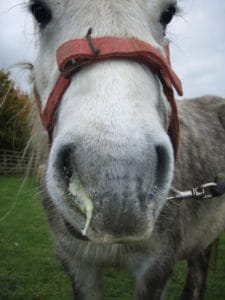
Strangles in Horses: Interpreting Gold-Standard Test Results
Researchers found that while any of the three tested qPCR diagnostic approaches can be effective in diagnosing true strangles cases, one stood out.

How to Effectively Supplement Horses With Vitamin E
With routine blood work and a strategic supplementation protocol, you can help your horse avoid the negative consequences associated with vitamin E deficiency. Here’s how.

Managing Headshaking in Horses: Magnesium, Boron Supplementation Might Help
Some severe headshaking cases that are resistant to existing treatments and can significantly compromise a horse’s quality of life. But researchers have recently determined that a supplementation regimen could help.
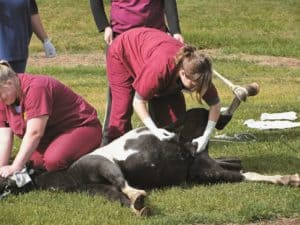
Horse Castration: Severe Complication More Common in Certain Breeds, Cases
Evisceration—when the intestines protrude through the surgical site—can be fatal if not treated promptly. By knowing which breeds and castration methods are more prone to evisceration, vets can be better prepared for complications.
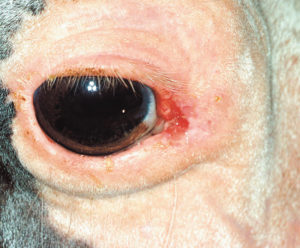
Protect Horses From Sun to Prevent SCC Recurrence
Researchers found that the only factor associated with a decreased risk of squamous cell carcinoma (or SCC, the most common ocular tumor in horses) recurrence was use of a fly mask with 90% or more UV light protection.
Brought to you by:






